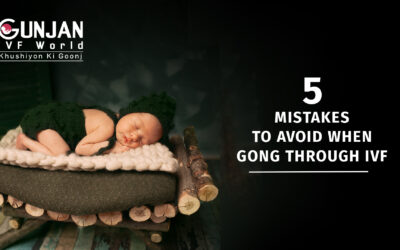IVF is a little bit of science, a lot of hard work d and lots of prayers. It’s always good to understand the science behind IVF. The whole process might take around 2-3 weeks. The treatment might also take longer than usual depending upon your medical condition. The success rate of IVF treatment varies from 40 to 60 percent.
You are advised to follow all the precautions and medicinal treatments prescribed by our doctors for a successful IVF. Here is the step-by-step process of an IVF cycle.
Here’s the IVF Treatment: A Step by Step Guide
1. Assessing the Fertility of the couple
Before starting your IVF treatment, we determine the fertility potential of both partners. The ovaries and other female reproductive organs are assessed by Ultrasound. Hormonal Profiling is done by blood tests to know the egg-producing capabilities of the ovaries. If the ovaries aren’t capable of producing enough eggs, an egg donor is recommended. We provide egg donors at an extra cost. For male partners, Semen Analysis and Semen Culture is done to check the sperm count, motility, morphology, and bacterial infections. If the sperm count is less than 5 million/ml, IVF ICSI with a sperm donor is recommended.
2. Stimulation of Ovaries
You are given Hormonal injections so that ovaries can produce more eggs instead of just 1 egg that is usually produced every month. Having more eggs improves your chances of IVF treatment. The growth of your follicles (eggs) is monitored by regular ultrasound scans. You are given a date when your eggs would be retrieved.
20+ Years Of Experience as Fertility Specialists
20 Years Of Experience as a Fertility Specialists
National Fertility Awards 2023
Call Us
+919990044555
FURTHER READING
Book An Appointment
Follow Us On
3. Retrieving the Eggs (Ovum Pick Up)
You are first given general anesthesia to relieve you from the pain during the treatment. A thin needle is then passed through the upper vaginal wall while getting the same monitored with an Ultrasound. Eggs are then retrieved from ovaries using special suction equipment. Once the task is finished, the oocyte (egg) is separated from the follicular fluid and then placed into a culture dish containing nutrient media. An embryologist performs ICSI on these eggs.
4. Fertilization of Eggs (ICSI)
ICSI (Intra Cytoplasmic Sperm Injection) process starts with a sperm sample either from the male partner or a sperm donor. The egg and sperm are manually fertilized under a microscope by a process called ICSI. The fertilized cells are then placed into an Incubator and monitored till the development of a healthy embryo in the process.
5. Embryo Transfer (ET)
This is the last step in the whole IVF process where the embryo gets transferred in the uterus. During the process, the embryos get checked first to ascertain the healthiest embryo which is going to be transferred. The embryo(s)are transferred using a specially designed ET catheter (very narrow tube) into the Uterus.
The exact position to plant the embryos is determined by your doctor using Ultrasound. Embryo Transfer typically takes 20-30 minutes. Once the patient is through with the process, she is advised bed rest for some time.
6. Confirmation of Pregnancy
After 15 days of Embryo Transfer, we advise you to undergo through BHCG test to confirm the pregnancy. You can get this test done at us or at any other pathology lab. If BHCG is positive, it means that the IVF treatment is successful. You are advised to meet our doctors with the BHCG test results for further treatment.
Share this with
Related Blogs
Can cold affect IVF treatment?
Comprehensive Fertility Treatments | Gynaecology Procedures | Menopause Management | Pregnancy Care | Maternity & Birthing Call +919990044555IVF experts of the best IVF clinic in Ghaziabad – Gunjan IVF World pen a simple piece on how cold can impact IVF...
5 mistakes to avoid when going through IVF treatment
Comprehensive Fertility Treatments | Gynaecology Procedures | Menopause Management | Pregnancy Care | Maternity & Birthing Call +91-9990044555IVF experts of the best IVF clinic in Ghaziabad – Gunjan IVF World share an article on what to avoid when undergoing IVF...
Follow Us On
About Author





